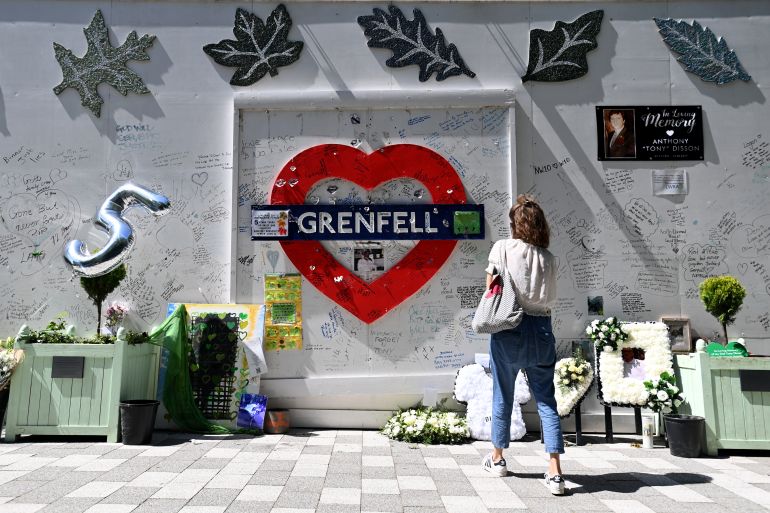Memorials held five years on from London’s worst residential fire
London marks the fifth anniversary of the Grenfell Tower fire that killed 72 people.

The names of the 72 people who perished in the United Kingdom’s worst residential fire since World War II were read out on Tuesday at a church service marking the fifth anniversary of the blaze.
Survivors and families of the victims of the Grenfell Tower fire gathered at Westminster Abbey for the first of a day of events to remember the tragedy.
Keep reading
list of 2 itemsGrenfell inquiry targets firefighters, not root causes
The fire started in a faulty freezer and ripped through the 24-storey block in west London in an inferno that was visible across the British capital.
An official report blamed highly combustible cladding fixed to the exterior of the high-rise as the “principal reason” the fire spread.
But despite a costly ongoing public inquiry, the government has been accused of failing to implement urgent safety changes to prevent a similar tragedy.
Also on Tuesday, attendees observed a 72-second silence and laid flowers at the foot of the tower, which is still shrouded in tarpaulin.
‘Tinderbox’
Five years on, emotions remain raw about the treatment of survivors and the bereaved, some of whom are yet to be permanently rehoused.
The local Anglican Bishop of Kensington, Graham Tomlin, said in the years before the fire, Grenfell had become a “tinderbox” and a tragedy was inevitable.
“The memory of today is really hard for people,” he told Times Radio. “People are still deeply traumatised by it.”
The firefighters who braved the heat and flames to try to rescue residents have accused the government of failing to take fire safety seriously.
The general secretary of the Fire Brigades Union, Matt Wrack, said firefighters and the Grenfell community had a “bond that was forged in tragedy”. But there had been job cuts across the service since 2017.
“The community have faced constant denials from those responsible for Grenfell being covered in cladding as flammable as petrol,” he said. “They have faced a wait for criminal charges that continues to this day.”
The FBU has also highlighted “multiple failings” in the testing and approval of cladding, insulation and other material used in the Grenfell Tower.
It claimed the tragedy could have been averted had the building’s regulator not been privatised and been “dependent on fee income” from manufacturers.

Grenfell campaigners say the fire and its aftermath have exposed gaping social inequality. They argue changes would have been implemented sooner had low-income workers and ethnic minority families in social housing not been the ones affected.
There has also been a wider outcry among homeowners who have been forced to pay for the removal of unsafe cladding in the high-rises where they live. Many have been unable to sell their properties or get proper insurance.
The Times newspaper reported that about 640,000 people were still living in buildings with the same type of cladding material.
Government ministers have also been condemned for advising as late as last month that residents should wait for help before evacuating during a high-rise fire.
“A lot of people who managed to survive were people who managed to get out early because they ignored the ‘stay put’ advice,” said Tiago Alves, 25, who escaped with his mother, father and younger sister. “I’m gobsmacked at the fact that we’re still having this conversation five years on.”

London Mayor Sadiq Khan, from the main opposition Labour Party, praised survivors for their campaign to improve public safety.
The ongoing public inquiry was “painstakingly unearthing the truth” – that profits were prioritised over public safety and deregulation weakened building standards, he said.
“The response from the government, building developers and owners has fallen far short of what the families of the victims and survivors have every right to expect,” he wrote in The Observer on Sunday.
“We still have too many residents in London and across the country living in high-rise buildings that are covered in dangerous flammable cladding, and we are still seeing designs for buildings that have critical safety failings.”